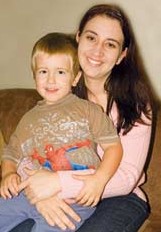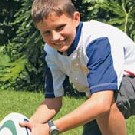
By ILSE SALZWEDEL and the HEALTH24 TEAM
As a swimming champ he's an expert on things aquatic. Yet few people know that Roland Schoeman is also an expert on asthma. Since childhood he's known what it's like to feel as if you're suffocating, to gasp for air and to scrabble for your inhaler as the muscles in your chest contract as they force air through your swollen, inflamed bronchial tubes.
Roland is all too familiar with the symptoms that signal an asthma attack: sudden, shallow yet harsh breathing; tight, whistling lungs and desperate coughing. He's haunted by memories of how, as a soccer-mad primary-school boy, he'd be overcome on the soccer field during a match, and would be forced to stand on the sidelines, struggling to breathe, pumping his inhaler. He can still remember the shame, the embarrassment, and how powerless it made him feel.
Today, when Roland talks about these attacks, he speaks for millions of people, many of them active and sporty, whose lives are limited by asthma. "Being forced to stand on the sidelines gives your self-esteem a knock. You feel you're letting your team down," he explains.
Yet the sporting achievements of asthma sufferers bear testimony to the amazing progress that's been made in treating asthma correctly.
Divan's story
Roland was six years old when he was diagnosed. Little Divan Barnard of Brackenfell near Cape Town was only six months old when his parents rushed him to hospital for the first time.
The cortisone inhaler Divan uses every day keeps his asthma in check but he still has acute attacks from time to time.
By now his parents, Dirk and Maritza, can spot an attack long before it strikes: the occasional throat clearing becomes a continuous cough. He hunches over, looks anxious and his ribs separate as his chest tries to expand.
His parents have also learnt when it's time to reach for Divan's second asthma inhaler. If that doesn't work, they'll give him his cortisone tablets and use a nebuliser.
Even then, getting him to hospital as quickly as possible is sometimes their only option, which is why Divan's suitcase is always packed and ready at the front door.
To the staff at the Stellenbosch Medi-Clinic Divan is almost family. Everyone knows this brave, lively little boy who can't stop the tears when the physiotherapist thumps down hard on his back to loosen the stubborn phlegm secreted by his inflamed bronchial tubes.
Asthma on the increase
Like Roland and Divan, there are millions who suffer from asthma and the numbers are increasing. Both international and South African statistics indicate that the incidence of asthma has doubled in the past 20 years, probably as a result of greater pollution and unhealthy lifestyles, including less exercise.
The good news is asthma can be controlled with medication. The bad news is the mortality rate is increasing.
South Africa has the fourth-highest asthma death toll in the world among people between the ages of five and 34. The reason? Sufferers aren't treated correctly – or not treated at all.
The long-term consequences of not treating asthma correctly can be dire, as Roland learnt. Just before the Athens Olympics four years ago he discovered just how much lung function he'd already lost.
The swimming authorities had insisted that he have a lung-function test before they would allow him to use his inhaler. The test clearly showed the damage to his lungs. "The worst is I'd already got so used to living with asthma, I didn't even realise how bad it really was," the swimming champion says.
Roland initially started swimming to strengthen his lungs. In recent years, whenever he was short of breath, he'd simply take a hit or two of his inhaler. "Out of ignorance I thought that was enough!"
It was only when a pulmonologist took over his treatment that Roland gained full control over his asthma. The trick, he says, is to try to control both the asthma and his environment.
10% of Olympic athletes asthmatic
Not many people know that at least 10% of Olympic athletes are asthma sufferers. This figure indicates that with the right treatment nothing should stand in your way. Roland's sister, Samantha, has more severe asthma than her brother.
She wanted to be a showjumping champion, even though her doctor said her allergy to horses could kill her before she turned 21.
Thanks to medication she is pursuing her dream. "Asthma tends to run in families but it doesn't mean the end of your dreams," Roland insists.
Asthma can strike at any age. Most people usually get it before they turn five, but many women get asthma for the first time only in their forties, possibly as a result of hormonal imbalances.
You don't outgrow asthma, either. "Adults simply handle it better," says Dr Hannes van Rensburg, a Gauteng pulmonologist. "Children's airways are still developing. As they grow, their asthma improves. But asthma can come back when you're older and when there's a trigger, for example a specific allergen."
As an adult, you shouldn't underestimate the seriousness of your asthma: an attack can be deadly.
South Africans were stunned in 2001 when heart transplant pioneer Professor Chris Barnard collapsed and died next to a hotel swimming pool in Cyprus.
He'd suffered a sudden, acute asthma attack and couldn't get to his inhaler in time. But the chances of dying are slim thanks to the advances in asthma medication.
According to Dr André van Niekerk, a paediatric pulmonologist who practises in Alberton and Durban, modern asthma medication is excellent. You just have to use the right one.
Treatment
Asthma is actually two diseases in one: the chronic inflammation of the bronchial tubes coupled with the sudden onset of bronchial spasms.
That's why treatment has to be twofold, aimed at both prevention and relief. Cortisone inhalers are the preventers; bronchodilator inhalers are the relievers.
The two types of medication are so effective when used in tandem, "it's unacceptable for anyone receiving treatment to show any asthma symptoms," says Dr Robin Green of Johannesburg.
Beware, though. Specialists warn you shouldn't depend just on relief medications – you should use both kinds of inhalers. Those used to relieve symptoms open your bronchial tubes for only a short time and they don't have any effect on the underlying inflammation.
Even though asthma can't be cured and you might have to use preventive medication for the rest of your life, you can be completely symptom-free, play sport, sleep peacefully and no longer have acute attacks and need to be rushed to hospital.
It's vital to get asthma under control to prevent permanent lung damage. Dr Van Niekerk says it's one of the most common and potentially most dangerous diseases, yet many parents don't realise their children are sufferers.
He advises parents to be on the alert for signs and symptoms and to take immediate action.
If asthma in children isn't treated correctly it can lead to a lack of proper sleep, which in turn can limit bone growth and brain development.
Some studies also show the possible link between asthma, depression and suicide in teenagers, because the condition can adversely affect their state of mind.
All of which, doctors emphasise, is completely unnecessary.
'We kicked asthma'
Franna Stapelberg (13) of Alberton (left) has suffered from asthma since he was a baby; now first-team rugby and hockey player, athlete and cross-country runner.
His parents say:
"We removed the carpet and soft toys from his room and bought him a latex pillow. We regularly vacuum and treat his mattress for dust mites and make sure he uses his inhaler religiously."
Eric Wiehman (9) of Cape Town (left) has had asthma since he was a baby.
His parents say:
"We try our best to keep him away from allergens and have replaced his bedroom carpet with a wooden floor and his curtains with blinds."
Megan Cairns (9) of Benoni (left) was diagnosed last year. She even plays rugby with the boys now.
Her parents say:
"We try to avoid possible triggers such as colds. We’re always after her to wear a jersey or put on her slippers after she’s had a bath. We try to make sure no one smokes near her."
[This is an extract of an article that originally appeared in the Spring 2008 edition of YOU Pulse / Huisgenoot-POLS magazine. The current edition is on sale now.]
Read more:
Asthma Centre
What triggers asthma?
Practical advice for asthma sufferers (and their parents)
How does asthma medication work?
What happens when you get asthma?
How do you know if your child has asthma?
Asthma danger zones




 Publications
Publications
 Partners
Partners



















